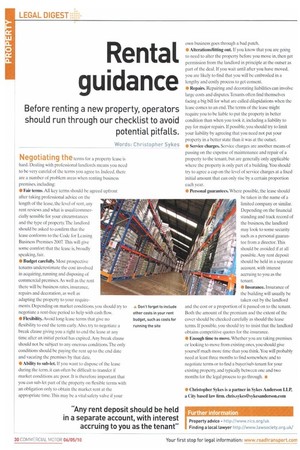Rental.
Page 30

If you've noticed an error in this article please click here to report it so we can fix it.
guidance
Before renting a new property, operators should run through our checklist to avoid potential pitfalls.
Words: Christopher Sykes
Negotiating the terms for a property lease is hard. Dealing with professional landlords means you need to be very careful of the terms you agree to. Indeed, there are a number of problem areas when renting business premises, including: 0 Fair terms. All key terms should be agreed upfront after taking professional advice on the length of the lease, the level of rent, any rent reviews and what is usual/commercially sensible for your circumstances and the type of property. The landlord should he asked to confirm that the lease conforms to the Code for Leasing Business Premises 2007 This will give some comfort that the lease is, broadly speaking, fair.
• Budget carefully. Most prospective tenants underestimate the cost involved in acquiring, running and disposing of commercial premises. As well as the rent there will be business rates, insurance, repairs and decoration, as well as adapting the property to your requirements. Depending on market conditions, you should try to negotiate a rent-free period to help with cash flow.
• Flexibility. Avoid long-lease terms that give no flexibility to end the term early. Also, try to negotiate a break clause giving you a right to end the lease at any time after an initial period has expired. Any break clause should not be subject to any onerous conditions. The only conditions should be paying the rent up to the end date and vacating the premises by that date.
• Ability to sub-let. If you want to dispose of the lease during the term, it can often he difficult to transfer if market conditions are poor. It is therefore important that you can sub-let part of the property on flexible terms with an obligation only to obtain the market rent at the appropriate time. This may be a vital safety valve if your own business goes through a bad patch.
• Alterations/fitting out If you know that you are going to need to alter the property before you move in, then get permission from the landlord in principle at the outset as part of the deal. If you wait until after you have moved, you are likely to find that you will be embroiled in a lengthy and costly process to get consent.
• Repairs. Repairing and decorating liabilities can involve large costs and disputes. Tenants often find themselves facing a big bill for what are called dilapidations when the lease comes to an end. The terms of the lease might require you to be liable to put the property in better condition than when you took it, including a liability to pay for major repairs. If possible, you should try to limit your liability by agreeing that you need not put your property in a better state than it was at the outset.
• Service charges. Service charges are another means of passing on the expense of maintenance and repair of a property to the tenant, but are generally only applicable where the property is only part of a building. You should try to agree a cap on the level of service charges at a fixed initial amount that can only rise by a certain proportion each year.
• Personal guarantees. Where possible, the lease should be taken in the name of a limited company or similar. Depending on the financial standing and track record of the business, the landlord may look to some security such as a personal guarantee from a director. This should be avoided if at all possible. Any rent deposit should be held in a separate account, with interest accruing to you as the tenant.
• Insurance. Insurance of the building will usually be taken out by the landlord and the cost or a proportion of it passed on to the tenant. Both the amount of the premium and the extent of the cover should be checked carefully as should the lease terms. If possible, you should try to insist that the landlord obtains competitive quotes for the insurance.
• Enough time to move. Whether you are taking premises or looking to move from existing ones, you should give yourself much more time than you think. You will probably need at least three months to find somewhere and to negotiate terms or to find a buyer/sub-tenant for your existing property, and typically between one and two months for the legal process to go through. • • Christopher Sykes is a partner in Sykes Anderson LLP, a City based law firm. chris.sykes@sykesanderson.com
Further information
IProperty advice http://www.rics.orgiuk Finding a Local lawyer httpli/www.lawsociety.org.uki




























































































































